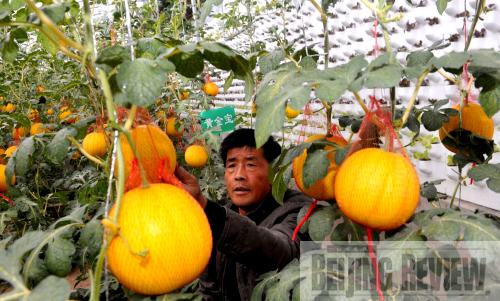|
 |
|
ROSY PATH: The Ningxia Hui Autonomous Region is fueling its economy by pressing ahead with modern facilitated agriculture (LIU QUANLONG) |
Vast areas of wild desert where not even a blade of grass can grow were once the homeland of many farmers in northwest Ningxia. But now with modern agriculture blossoming, these farmers have been set on a path toward affluence.
Zhao Yongbiao, Director of the Department of Agriculture and Animal Husbandry under the Government of the Ningxia Hui Autonomous Region, told Beijing Review that annual rainfall in Ningxia averaged 200 to 650 mm, leaving the central and southern mountainous areas all but desertified. The northern part, which relies on the Yellow River as a source of irrigation, is also starting to suffer from water strains, he said.
In an uphill battle against the severe drought, the local government, since 2005, has pumped heavy investment to construct drip irrigation and plastic greenhouses for growing agricultural products on the wasteland. The government-assisted business has been dubbed "facilitated agriculture."
Policymakers also offered a series of incentives to spur the facilitated agricultural practice, resulting in total investments in the past two years adding up to nearly 15 billion yuan ($2.2 billion), Zhao said.
The vigorous efforts are already paying off. By the end of June 2009, the area of facilitated agriculture had amounted to 774,000 mu (51,600 hectares) in Ningxia, accounting for 5 percent of its total cultivated land. By 2011, the acreage is expected to reach 1.4 million mu (933,333 hectares).
Zhao said the government is now geared up to expand facilitated agriculture into the southern mountainous areas where many farmers are still poverty stricken.
To achieve the maximum economic benefits, the facilitated agriculture of Ningxia has put the focus of production on cash crops, like vegetables and fruits that bring in higher revenues than grains. Major products include tomatoes, cucumbers, edible fungus and flowers, as well as tropical fruits. Almost 70 percent of the fruits and vegetables have found their way outside Ningxia, from domestic markets like Beijing and Hong Kong to the international markets of Russia and Central Asian countries, said Zhao.
Aside from simply providing more bountiful harvests, the new agriculture strengthens the capability of renewable planting, bumping up land use efficiency, he added.
But without a doubt, local farmers are the biggest beneficiaries of the new planting practice. According to data from the local economic department, a plastic greenhouse can generate 18,000 yuan ($2633.5) per mu on average.
Despite the prospects of generous government support, local residents at first turned a cold shoulder to the so-called facilitated agriculture, worrying about its profit potential, Jia Caiwang, a farmer in Helan County, told Beijing Review. In response, the local government initiated a pilot program that helped farmers develop the facilitated agriculture. One year later, the growing success became a catalyst, as more farmers began to adopt the new agricultural method, said Jia.
To date, the trend has attracted 5.63 billion yuan ($823.7 million) in private investments, 18 times that of government funded allocation.
In 2008, Zhongwei City in Ningxia found success in a risky experiment—relocating the greenhouses to desert regions to make full use of the sunshine, thus allowing the facilities to save energy. The positive results marked a movement in the right direction for Ningxia's green economy.
At the beginning of this year, the government of Zhongwei established a large agricultural base in the wild Tengger Desert with more than 7,000 solar greenhouses to press ahead with its modern agricultural development, providing a boost to the local economy. The agricultural measure was also helpful with sand control, as a number of wide forest belts were built up and sand-grown plants were fostered around the greenhouses in an effort to improve the local natural environment.
Ma Qinggui, Director of the Department of Science and Technology under the autonomous regional government, told Beijing Review that scientific improvement has also been a driving force behind facilitated agriculture. For instance, the most advanced wall materials were used to build the greenhouses, he said.
Ma added that Ningxia has put in place a service network all over the region to provide support for local farmers and promote cutting-edge technologies such as drip irrigation, soilless cultivation and formula fertilization.
In addition, the local government has introduced foreign agricultural equipment and crop varieties to meet the needs of the rapidly growing local economy.
The current focus of the regional government is to push technological promotion at the grass-roots level, said Ma. More efforts will be made to attract young technicians and university graduates to help with the facilitated agriculture, he said.
At present, construction of 1,000 new agricultural service stations is underway for providing technical training to 110,000 local farmers, he added. | 